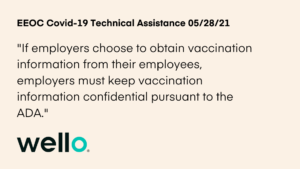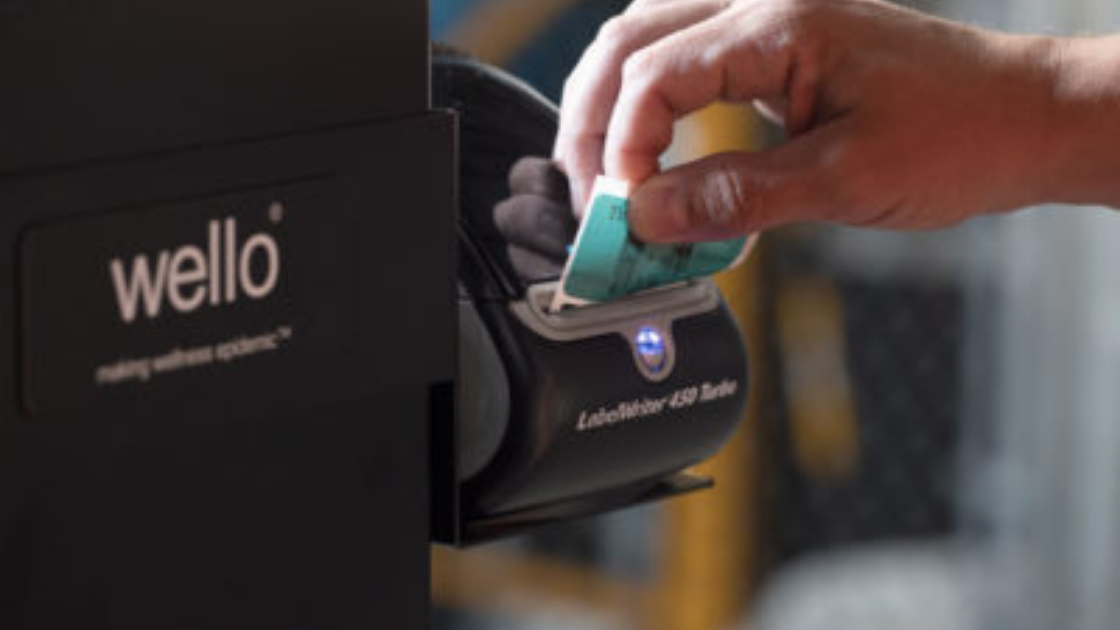As more employees return back to the workplace and employers navigate shifting rules and regulations over health and safety policies, the U.S. Equal Employment Opportunity Commission’s (EEOC) Covid-19 technical assistance can help guide decision-making in the workplace. They first provided technical assistance in May of 2021 and have now updated their technical assistance in October of 2021 as more difficult situations over vaccine mandates come to light as well.
In the original guidelines, the EEOC specifically addressed vaccination and incentive information under federal equal employment opportunity (EEO) laws—this is an important distinction, because other federal, state, and local laws may apply for both employers and employees in regards to vaccination or infection control policies. The updated technical assistance addresses the application of Title VII of the Civil Rights Act of 1964 for religious exemptions to Covid-19 vaccination requirements in the workplace.
Both employees and employers may, understandably so, have questions about how to navigate workplace rules regarding vaccination, and the guidelines aim to help answer some of the questions.
For instance, the guidelines provide some technical assistance information about the application of the Americans with Disabilities Act (ADA) and the Genetic Information Nondiscrimination Act (GINA) in regards to requirements about vaccination confirmation, what happens if an employee receives vaccination outside of the workplace, and what rules apply for incentive-driven vaccination confirmation.
Here’s what both technical assistance guidelines outline:

Employers can require documentation that proves their vaccination status
EEOC laws do not prevent employers from requiring employees to provide documentation or other confirmation of Covid-19 vaccination (or any required Covid testing results), but there is a catch: all information relating to the vaccine must be kept confidential, just as all other medical information is, and stored separately from the employee’s personnel files under the ADA.
In order to adhere to employee privacy regulations surrounding their protected health information, employers may want to consider adding a tool, such as Wello Health Cloud that securely stores Covid vaccination and/or testing results completely separately from personnel information. With the addition of a separate and secure employee health platform, employers can adhere to local, state, and federal regulations requiring proof of vaccination and/or weekly testing, all without accessing or altering the employee’s entire personnel file.
Employers can require Covid-19 vaccination for employees
Technically speaking, no federal EEO law prevents employers from requiring all employees who will be physically entering the workplace to be vaccinated against Covid-19. However, again, this is solely beneath federal EEO laws and other local or state rules may apply.
Federally speaking, the bottom line is that, under federal law, employers are not prevented from setting workplace requirements for vaccination, providing employers comply with the reasonable accommodation provisions of the ADA and Title VII of the Civil Rights Act of 1964 and other EEO considerations.
The EEOC also made a special note to point out that some individuals, as well as specific demographic groups, may face greater barriers to the vaccination, so a vaccination requirement could cause negative impacts in certain employees vs. others.
Employers can offer incentives to employees who prove they’ve been vaccinated
Again, this is due to the fact that, according to the EEO laws, there are no federal laws that prevent or limit employers from offering incentives for employees to voluntarily prove that they have been vaccinated.
However, if the employee does voluntarily provide proof of vaccination from a third party, the employer must still keep all vaccination information confidential, as under ADA rules.
Employers can also offer incentives to employees for voluntary vaccination
Even the EEOC seems to admit this one is tricky: they state that employers can offer incentives for vaccination, but only as long as those incentives are not “coercive.” What exactly constitutes coercion, however, is not defined, and the EEOC cautioned that “very large” incentives could make some employees feel pressured to disclose protected medical information.
Employers can raise awareness about vaccination benefits
According to the EEOC, federal law permits that employers can raise awareness about benefits of the vaccination and provide employees, along with family members, resources on the Covid-19 vaccine.
Employees and applicants to new positions with the company are required to inform their employer if they plan to seek an exemption to the employer’s Covid-19 vaccine requirement
Additionally, if the employee or applicant plans to seek an exemption, it must be due to a “sincerely-held” religious belief, practice, or observance.
Employers must consider requests for religious accommodations
Title VII does require that, under federal law, employers must consider requests for religious accommodations to vaccine requirements.
However, there is an exception to this law: employers who demonstrate “undue hardship,” such as severe staffing shortages, are not required to accommodate an employee’s request for religious accommodation.
Social, political, or economic viewpoints are not protected under religious exemptions
The updated technical assistance explains that while Title VII requires employers to consider requests for religious accommodations, it does not protect social, political, or economic views, or personal preferences of employees who seek exceptions to a Covid-19 vaccination requirement.
Discrimination protection in the workplace
In addition to guidelines for employers and employees navigating vaccine requirements and documentation regulations in the workplace, the EEOC also has a resource that specifically addresses federal protections from Covid-19-related discrimination at work.
The federal protections against discrimination include:
-
- “Reasonable accommodations” for employees who cannot take the Covid-19 vaccine based on disability or religious exemptions, such as wearing a mask or social distancing.
- Protections against being forced to work in a physical environment if you are high risk and 1) your job can be done at home and 2) you have a disability as defined under the Americans with Disabilities Act.
- Protections for pregnant employees who wish to work from home, if their employer is allowing other employees to work from home.
- Preventing employees from working, with certain conditions, such as a disability or pregnancy.
- Protections against being harassed at work for national origin; race; color; religion; older age (age 40 and older); sex (including pregnancy, sexual orientation, and gender identity); genetic information; or disability. The EEOC provided an example of an Asian-American employee who is being discriminated against.
Again, it’s important to remember that the EEOC’s technical assistance only provides information to how employers and employees can navigate federal laws, and other state or local laws may also apply as well. The EEOC also states that it will offer additional updates and information if new developments are made.


